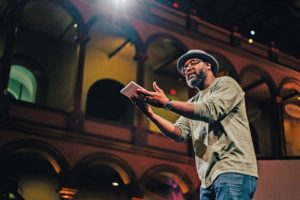Reginald Dwayne Betts was a reader growing up, devouring Sherlock Holmes mysteries and scouring encyclopedias for basketball stats. But he didn’t give much thought to writers.
“I thought books were these amazing things that were disconnected from their writers,” he says. “It was only later, when I went to prison, that I went on a slightly different pathway of desiring to make art for myself.”

Betts is the author of three volumes of poetry, a memoir, a play, and numerous essays.
He is the recipient of the Truro Center for the Arts 2022 Woody English Distinguished Artist and Writer’s Chair and will be reading his poetry at Castle Hill’s Edgewood Farm on July 26. When he was offered the chance to read in Truro, he says, he jumped at it.
Betts spent time on the Outer Cape shortly after his 2005 release from prison to take a summer course with poet Marie Howe at the Fine Arts Work Center in Provincetown. “This was the first summer I came home from prison, and my first real trip anywhere, actually,” he says.
At 16, Betts pleaded guilty to an armed carjacking at the Springfield Mall in Fairfax, Va., not far from District Heights, Md., the D.C. suburb where he grew up. He was tried as an adult and spent eight years incarcerated in Virginia. He spent time in solitary confinement.
“Everyone has a book that makes them think about literature in a radically different way,” Betts says. For him, this was The Black Poets, an anthology edited by Broadside Press founder Dudley Randall. The book appeared under Betts’s cell door while he was in solitary after he’d called out, “Somebody, bring me a book!”
Through The Black Poets, Betts encountered the work of Sonia Sanchez, Claude McKay, and Lucille Clifton, which would become a formative part of his own literary journey. He says Clifton taught him the power of poetry to remind readers of complexities of the human condition “that are so, so easy to forget.”
Clifton’s verse “everyday/ something has tried to kill me/ and has failed” from “won’t you celebrate me” radically shifted his perspective as a reader. “Words can lead to a possibility not inherently true before you encountered those words,” Betts says.
Betts’s career now spans multiple disciplines. He holds a J.D. from Yale Law School, has worked as a poetry editor of the New York Times Magazine, and is founder and director of Freedom Reads, an organization dedicated to bringing books into prisons. Freedom Reads organizes author visits, builds libraries, and facilitates reading circles.
“I wanted to bring beauty into prisons,” says Betts. “Far too often, the only thing that’s beautiful in a prison are the people — if we even recognize ourselves as beautiful.”
Betts describes shelving units his organization has built for prisons. They’re made from reclaimed maple, walnut, cherry, and red oak — wood that would otherwise have been “headed out to a trash heap somewhere,” Betts says. “Even if people think there’s no value in the wood, it can still be made beautiful.”
In 2019, Betts wrote in the Times that Clifton’s poem “the times” addresses issues that still plague us today — including racial violence. “The poems are about loss,” he writes of Clifton’s collection Blessing the Boats, “but also something else: how history and memory do sometimes propel us forward.”
Betts’s poems deal with memory and loss as well. He says he often writes ghazals, an Arabic form of poetry that traditionally evokes both love and longing.
Betts’s poem “Ghazal,” published in his 2019 collection Felon, begins, “Name a song that tells a man what to expect after prison;/ Explains Occam’s razor: you’re still a suspect after prison.” The losses it describes are deep ones: “My mother has died. My father, a brother & two cousins./ There is no G-d; no reason to genuflect, after prison.”
The poet says forms like the ghazal, sonnet, and sestina give him more control over his creativity. He likes to borrow from different genres. “I take my understanding of narrative poetry and try and apply it to prose, but then I take some things I’ve learned from prose in terms of pace and apply it to poetry,” he says.
Art is central to his solo theater piece Felon: An American Washi Tale. The play looks at paper as a key part of the experience of incarceration — money, letters that are known inside as “kites,” stoves made of toilet paper, affidavits, certificates of pardon, legal complaints.
“The power of literature,” Betts says, is “in many ways very private and very intimate.” But in it he has also found a way of reaching others, countering what prison does to the human spirit, and revealing the way prison touches us all.
Surviving Solitary
The event: Reginald Dwayne Betts poetry reading
The time: Tuesday, July 26 at 6 p.m.
The place: Truro Center for the Arts at Edgewood Farm, 3 Edgewood Way, Truro
The cost: $30 at castlehill.org



